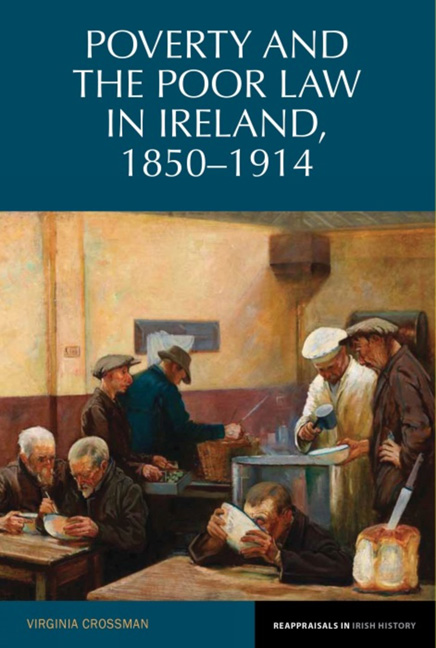Book contents
- Frontmatter
- Contents
- List of Figures
- List of Tables
- List of Maps
- Acknowledgements
- Introduction
- Chapter 1 Concepts of Poverty and Poor Relief
- Chapter 2 Context and Trends
- Chapter 3 Outdoor Relief
- Chapter 4 The Workhouse
- Chapter 5 The Sick, Infirm and Lunatics
- Chapter 6 Single Mothers and Prostitutes
- Chapter 7 Mendicancy and Vagrancy
- Conclusion
- Note on statistics and Sources
- Bibliography
- Index
Chapter 5 - The Sick, Infirm and Lunatics
- Frontmatter
- Contents
- List of Figures
- List of Tables
- List of Maps
- Acknowledgements
- Introduction
- Chapter 1 Concepts of Poverty and Poor Relief
- Chapter 2 Context and Trends
- Chapter 3 Outdoor Relief
- Chapter 4 The Workhouse
- Chapter 5 The Sick, Infirm and Lunatics
- Chapter 6 Single Mothers and Prostitutes
- Chapter 7 Mendicancy and Vagrancy
- Conclusion
- Note on statistics and Sources
- Bibliography
- Index
Summary
As the constituent elements of the workhouse population changed in the decades after 1860, so the character and function of the institution altered. As a British Medical association Report on workhouses infirmaries noted in 1895, when the poor law was first introduced the sick were an ‘unimportant section’ of the workhouse population, ‘Now the able-bodied have almost vanished off the land, their place being taken by infirm and aged class, and the sick.’ The growing emphasis within the workhouse on specialised treatment mirrored developments in England. Medical matters became a regular item on the agenda of boards of guardians and while they often resisted acting on the advice of their medical officers, they found it increasingly difficult to ignore it altogether. From the later part of the nineteenth century, stricter classification and improved standards of care helped to lessen the stigma associated with workhouse hospitals. Assessing developments in England, Alysa Levene has concluded that medical services for the poor were ‘variable in coverage and quality’, and improvements dependent on ‘the initiative of individual officers and long-held expectations on entitlements as well as finance and government directives’. In Ireland too, progress was uneven and subject to considerable local variation. By the early twentieth century, standards of care across the country had improved, but many workhouse hospitals remained poorly equipped and understaffed.
From the 1850s workhouse hospitals were attracting people seeking medical attention rather than relief. In 1851, Dr Kirkpatrick, Medical Officer in NDU Workhouse, reported that a decline in hospital accommodation in the city, due to the withdrawal of government grants, had meant that a ‘vast number of invalids’ were seeking admittance to the workhouse ‘solely as a hospital’. Kirkpatrick and his colleague Dr Monaghan, lobbied the board of guardians for additional medical attendance. Two additional medical officers were appointed in March at salaries of fifty pounds per annum. Following the opening of workhouse infirmaries to non-destitute patients in 1862, the importance of workhouse hospitals increased. In many rural towns the workhouse infirmary constituted the only hospital in the locality. In major cities the workhouse was not the only medical facility open to the poor, but it was invariably the largest. The union infirmaries in Cork and Belfast, for example, provided accommodation for more patients than all the voluntary hospitals put together.
- Type
- Chapter
- Information
- Poverty and the Poor Law in Ireland, 1850–1914 , pp. 139 - 167Publisher: Liverpool University PressPrint publication year: 2013



